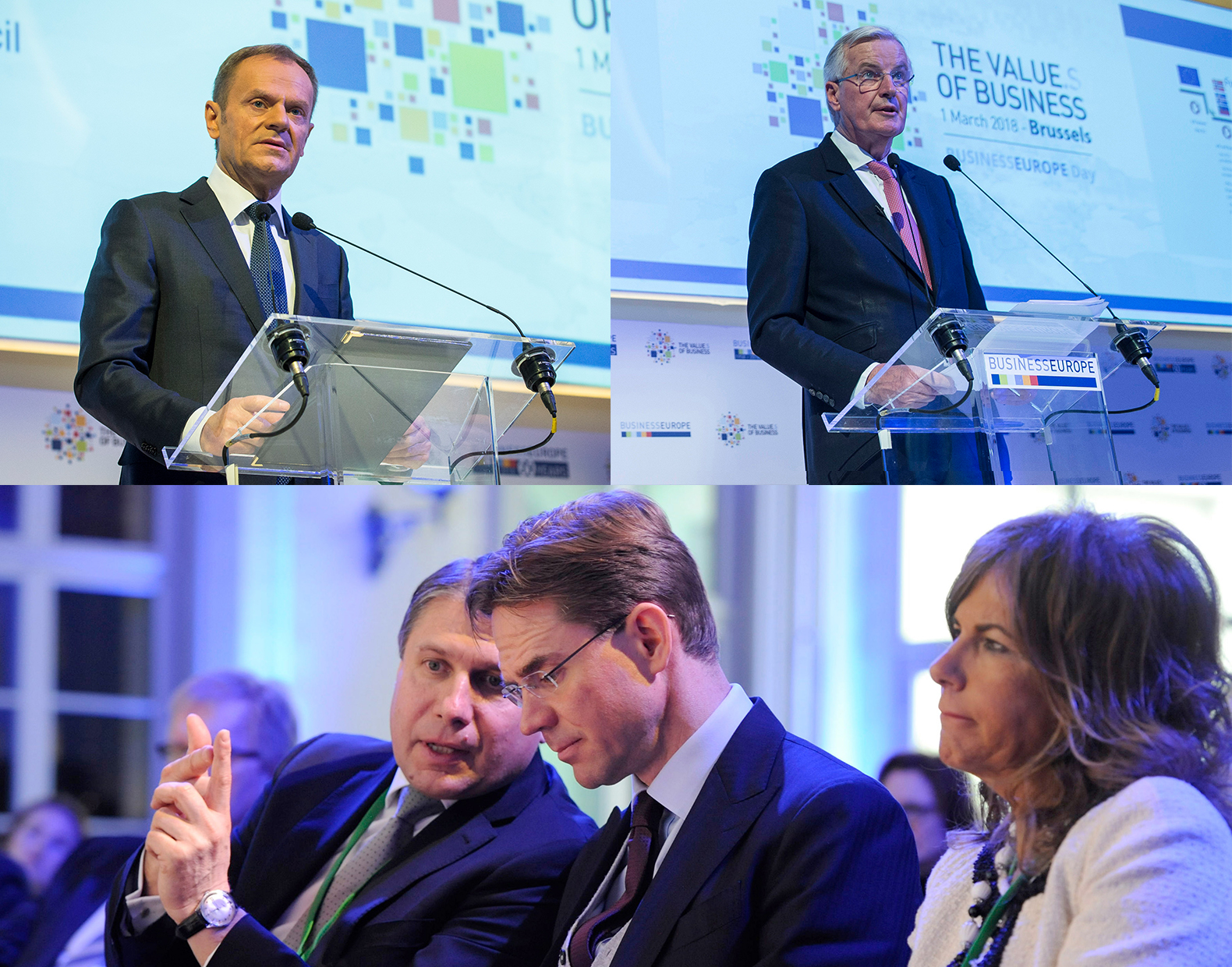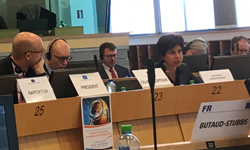BusinessEurope Headlines No. 2018-08
BusinessEurope Day 2018: The value.s of business

“We have a key role to play in making sure that our model of social market economy continues to thrive. This is why we chose to focus BusinessEurope Day 2018 on the value.s of business”, President Emma Marcegaglia said at the opening of BusinessEurope Day on 1 March 2018 in Brussels. The fourth edition of the event coincided with BusinessEurope’s 60th anniversary. Donald Tusk, President of the European Council, Jyrki Katainen, Vice-President of the European Commission, and Michel Barnier, Chief Negotiator of the Task Force for the Preparation and Conduct of the Negotiations with the United Kingdom under Article 50 TEU, also delivered keynote speeches to an audience of about 350 people, including top-level politicians and leaders of the European industry. “Under this slogan, we want to discuss the value of business for society as well as the values of European business”, Marcegaglia commented. See the pictures.
![]()
![]() Contact: Carolina Krause
Contact: Carolina Krause
Video message on the 60 years of BusinessEurope
What is the value of business for society and what are the values of European business? Watch this video to learn more.
Screening of FDI into the EU – discussing the right framework
 Luisa Santos, International Relations Director, represented BusinessEurope in the Public Hearing organised by the European Economic and Social Committee on the screening of foreign direct investments (FDI) into the EU on 27 February 2018. “Maintaining the right balance between achieving legitimate objectives on security and ensuring a welcoming environment for much needed FDI in the EU is key and should be respected”, Santos stated. Currently in the process of analysing the Commission’s proposal and working on a position, BusinessEurope welcomes the efforts to offer, through the draft regulation, legal certainty and provide criteria that should be followed in the context of national screening mechanisms. At the same time, it is important to develop a proposal that works in practice, without creating additional bureaucracy and costs. For this reason, definitions need to be further clarified and the scope should be maintained under the legal basis of security and public order. One of the central objectives of the proposal is to establish a cooperation mechanism that will enable the exchange of information between the European Commission and the Member States. It will also give the possibility to Member States and the Commission to provide comments and advisory opinions, respectively, to other Member States when there are concerns on their security and public order. There are many open questions on how the system will be implemented and BusinessEurope is open to discussing solutions. Critical in this context, however, is to ensure that commercially sensitive information of companies is protected and that the cooperation mechanism is not misused by competitors.
Luisa Santos, International Relations Director, represented BusinessEurope in the Public Hearing organised by the European Economic and Social Committee on the screening of foreign direct investments (FDI) into the EU on 27 February 2018. “Maintaining the right balance between achieving legitimate objectives on security and ensuring a welcoming environment for much needed FDI in the EU is key and should be respected”, Santos stated. Currently in the process of analysing the Commission’s proposal and working on a position, BusinessEurope welcomes the efforts to offer, through the draft regulation, legal certainty and provide criteria that should be followed in the context of national screening mechanisms. At the same time, it is important to develop a proposal that works in practice, without creating additional bureaucracy and costs. For this reason, definitions need to be further clarified and the scope should be maintained under the legal basis of security and public order. One of the central objectives of the proposal is to establish a cooperation mechanism that will enable the exchange of information between the European Commission and the Member States. It will also give the possibility to Member States and the Commission to provide comments and advisory opinions, respectively, to other Member States when there are concerns on their security and public order. There are many open questions on how the system will be implemented and BusinessEurope is open to discussing solutions. Critical in this context, however, is to ensure that commercially sensitive information of companies is protected and that the cooperation mechanism is not misused by competitors.
Contact: Sofia Bournou
EU-ASEAN: bilateral agreements or regional approach?
 “There is a business and economic argument, beyond the geopolitical one, in support of a region-to-region free trade agreement between the EU and ASEAN (Association of Southeast Asian Nations) countries”, said Eleonora Catella, Senior Adviser for Trade, at the event “Prospects for EU-ASEAN Trade”, organised by the EU-Asia Centre in cooperation with Borderlex on 27 February 2018. She added that a region-to-region approach would minimize fragmentation and ensure consistency of rules, a necessity especially for small companies that find navigating different rules under different agreements challenging. Bilateral agreements with ASEAN countries can serve as stepping stones towards a region-to-region trade deal. “There is also a competition element. ASEAN has already concluded seven agreements with neighbouring countries and some of its members are parties to the TPP11 (Trans-Pacific Partnership). Every delay in the ratification or negotiation of bilateral agreements with individual ASEAN countries puts EU companies at an increased disadvantage vis-à-vis competitors from other countries”, Catella commented.
“There is a business and economic argument, beyond the geopolitical one, in support of a region-to-region free trade agreement between the EU and ASEAN (Association of Southeast Asian Nations) countries”, said Eleonora Catella, Senior Adviser for Trade, at the event “Prospects for EU-ASEAN Trade”, organised by the EU-Asia Centre in cooperation with Borderlex on 27 February 2018. She added that a region-to-region approach would minimize fragmentation and ensure consistency of rules, a necessity especially for small companies that find navigating different rules under different agreements challenging. Bilateral agreements with ASEAN countries can serve as stepping stones towards a region-to-region trade deal. “There is also a competition element. ASEAN has already concluded seven agreements with neighbouring countries and some of its members are parties to the TPP11 (Trans-Pacific Partnership). Every delay in the ratification or negotiation of bilateral agreements with individual ASEAN countries puts EU companies at an increased disadvantage vis-à-vis competitors from other countries”, Catella commented.
Contact: Eleonora Catella
The future of low-emission mobility
 “BusinessEurope fully supports E urope’s intentions to move to a healthy, competitive economy that is driven by low-carbon modes of transport”, said BusinessEurope Director General Markus J. Beyrer in a letter addressed to the European Commissioner for Transport Violeta Bulc and other high-level policymakers. In order to achieve this, Beyrer’s key messages are that all technologies, fuels and efficiencies should be able to compete with one another, and that the EU should take an integrated policy approach by taking on board impact assessments and the Innovation Principle. Business and other stakeholders should also be intensively involved, as “many billions of investments will be made in the coming years, and we must make sure that a significant share of those investments is made in Europe”, he added.
“BusinessEurope fully supports E urope’s intentions to move to a healthy, competitive economy that is driven by low-carbon modes of transport”, said BusinessEurope Director General Markus J. Beyrer in a letter addressed to the European Commissioner for Transport Violeta Bulc and other high-level policymakers. In order to achieve this, Beyrer’s key messages are that all technologies, fuels and efficiencies should be able to compete with one another, and that the EU should take an integrated policy approach by taking on board impact assessments and the Innovation Principle. Business and other stakeholders should also be intensively involved, as “many billions of investments will be made in the coming years, and we must make sure that a significant share of those investments is made in Europe”, he added.
![]() Contact: Leon De Graaf
Contact: Leon De Graaf
Written statement directive revision should avoid creating legal uncertainty and rigidity on labour markets
 The proposal for a directive on transparent and predictable working conditions issued by the European Commission on 21 December 2017 is a missed opportunity to modernise the written statement directive. BusinessEurope outlined its views on the topic in a position paper published on 26 February 2018. This proposal will create unnecessary costs, rigidity and fundamental legal uncertainty for companies and employees. It disrespects the principles of subsidiarity and proportionality. We are particularly concerned about the proposal to include a broad definition of a ‘worker’. This definition could lead to a customer relationship being requalified into an employment relationship, by covering what many Member States rightly consider as self-employed consultants or freelancers. Furthermore, the proposed new minimum rights will introduce restrictions for often high-paid, high-skilled key staff for companies, harming their competitiveness. The focus going forward should be on modernising and adapting existing rules, rather than introducing new rights which are best dealt with at national, sectoral or company levels.
The proposal for a directive on transparent and predictable working conditions issued by the European Commission on 21 December 2017 is a missed opportunity to modernise the written statement directive. BusinessEurope outlined its views on the topic in a position paper published on 26 February 2018. This proposal will create unnecessary costs, rigidity and fundamental legal uncertainty for companies and employees. It disrespects the principles of subsidiarity and proportionality. We are particularly concerned about the proposal to include a broad definition of a ‘worker’. This definition could lead to a customer relationship being requalified into an employment relationship, by covering what many Member States rightly consider as self-employed consultants or freelancers. Furthermore, the proposed new minimum rights will introduce restrictions for often high-paid, high-skilled key staff for companies, harming their competitiveness. The focus going forward should be on modernising and adapting existing rules, rather than introducing new rights which are best dealt with at national, sectoral or company levels.
![]() Contact: Maxime Cerutti
Contact: Maxime Cerutti
A new framework for financial markets’ supervision should foster integration and efficiency
 Supervisory convergence is an important aspect of the Capital Markets Union and an important tool to remedy market fragmentation, BusinessEurope sets out in a position paper regarding the European Commission’s proposals to review the role of the European Supervisory Authorities (ESAs). The paper states that reinforcement of certain powers of the ESAs must be considered in tandem with the need to keep the day-to-day supervision at the local level. The added value of the ESAs lies in their sector expertise and the oversight of the national supervisors to improve co-ordination and ensure the convergence of supervisory opinions through peer group review and assistance with developing consistency to technical rule-making across Europe as well as to ensure harmonised application of those rules. It should be avoided that the existing ESAs framework is made more complex or burdensome for firms without clear benefits of integration or efficiency.
Supervisory convergence is an important aspect of the Capital Markets Union and an important tool to remedy market fragmentation, BusinessEurope sets out in a position paper regarding the European Commission’s proposals to review the role of the European Supervisory Authorities (ESAs). The paper states that reinforcement of certain powers of the ESAs must be considered in tandem with the need to keep the day-to-day supervision at the local level. The added value of the ESAs lies in their sector expertise and the oversight of the national supervisors to improve co-ordination and ensure the convergence of supervisory opinions through peer group review and assistance with developing consistency to technical rule-making across Europe as well as to ensure harmonised application of those rules. It should be avoided that the existing ESAs framework is made more complex or burdensome for firms without clear benefits of integration or efficiency.
![]() Contact: Erik Berggren
Contact: Erik Berggren
Calendar
- 4 March: Italian elections
- 5 March: Environment Council
- 7 March: European semester winter package
- 7 March: Capital Markets Union package
- 12 March: Competitiveness Council
- 13 March: Banking Union package
- 13 March: Future of EU energy and climate policy
- 13 March: Social Fairness package